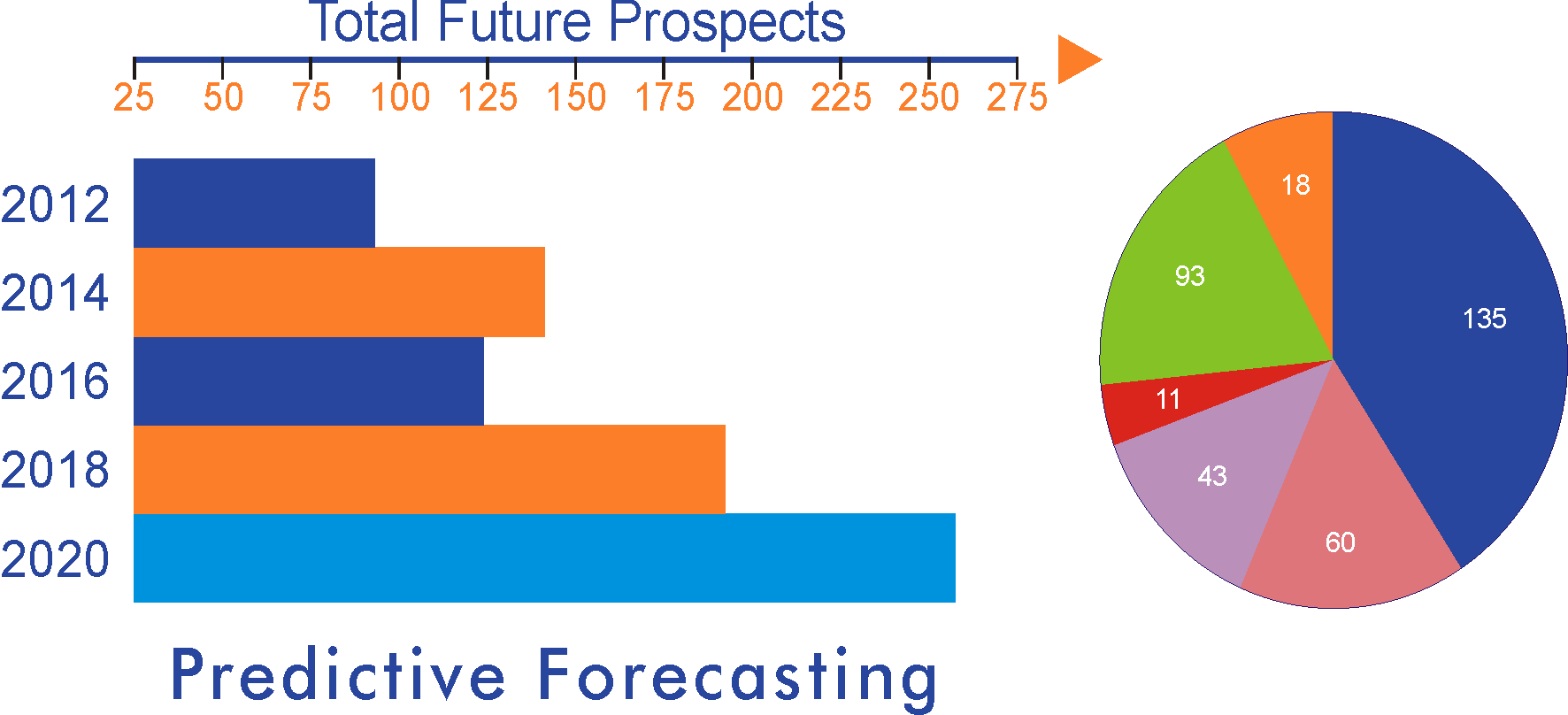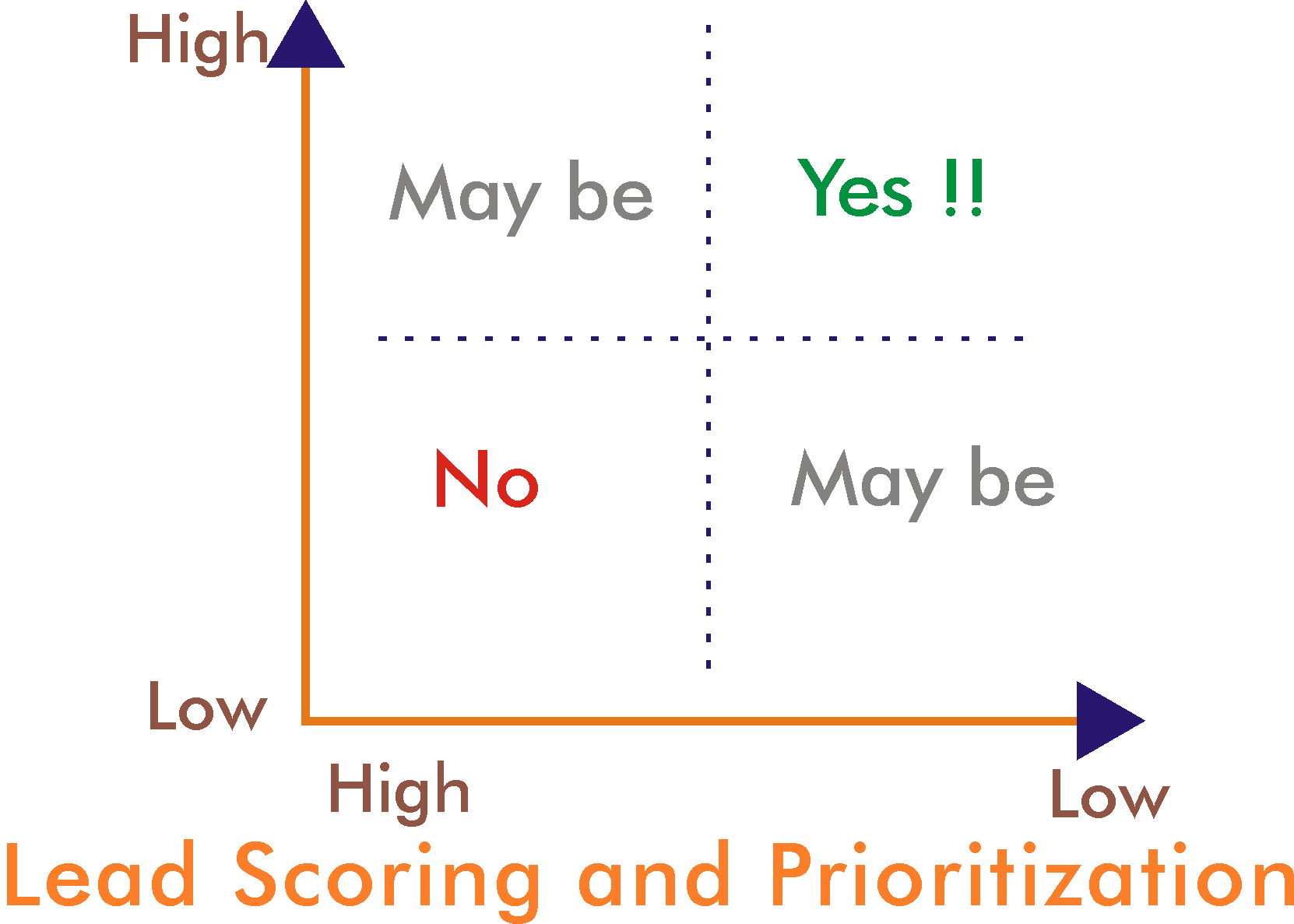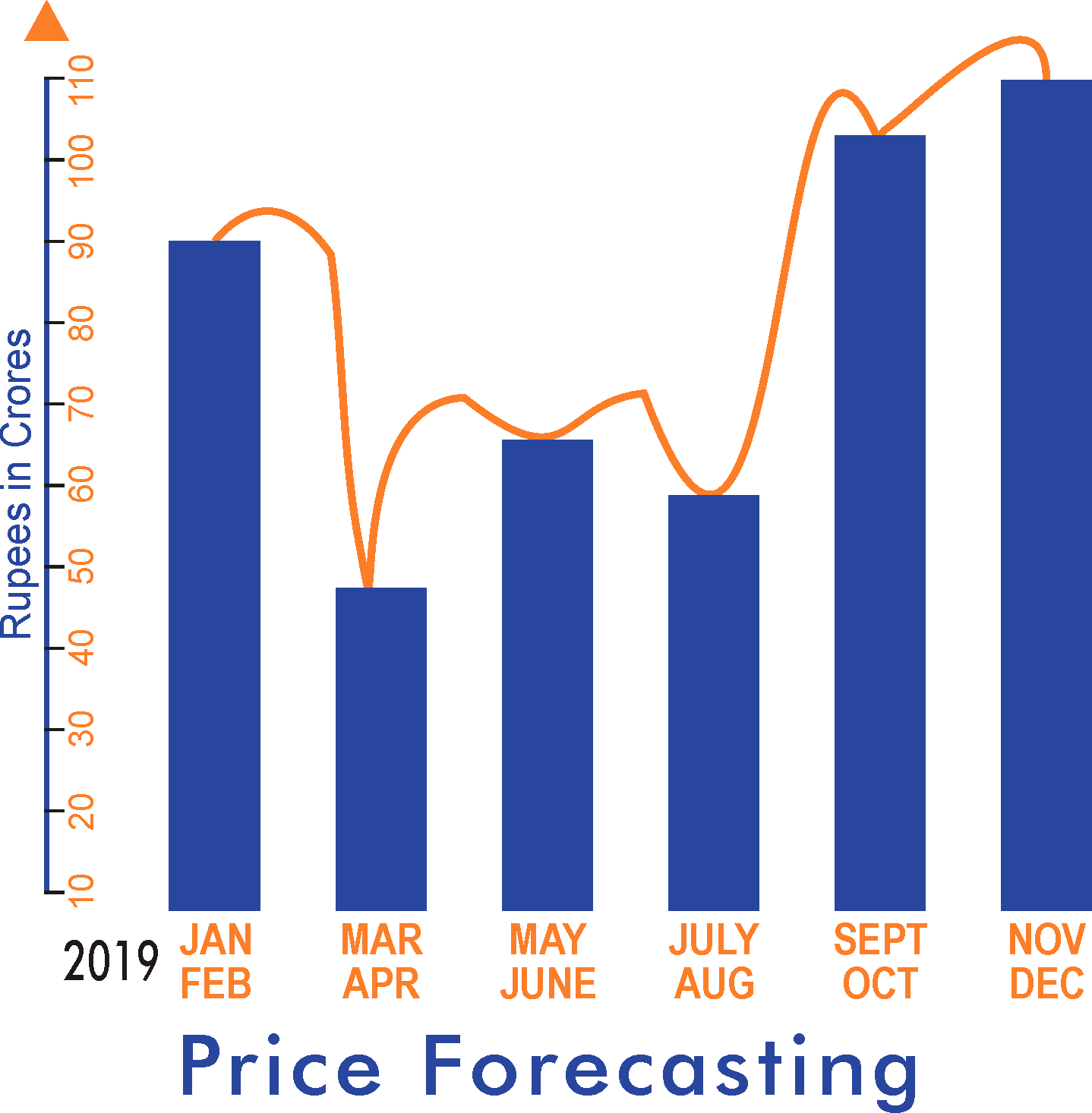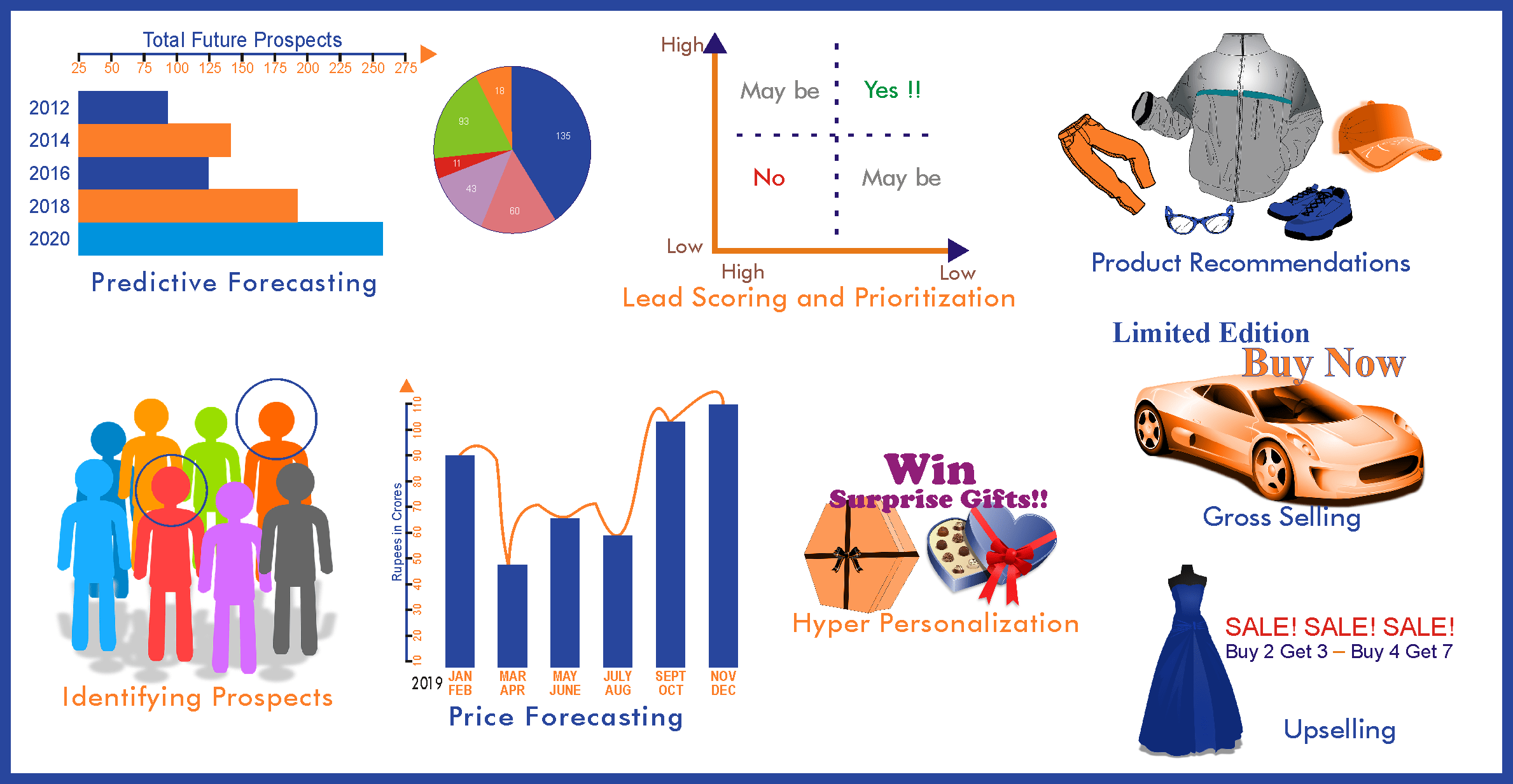A customer spends several hours browsing around different sites and apps before he/she decides which product to buy and from where. Likewise e-commerce apps and sites get millions of visitors and page views daily from different touch points. Huge amount of data is generated through these page views and visitors which is rich in context. When customers visit a brand they leave a trail of information behind which is called as Customer Journey (an interesting read about how to map customer journey is here). This large volume of data can be processed by AI for effective and efficient sales planning to help the sales teams in achieving pre-defined sales targets.
AI-driven automated marketing platforms help brands to record consumer information and apply predictive analytics models to the data sets gathered and extract insights like product purchase history, customer preferences, reason or motivation for purchasing the specific product. Self-learning tools help brands to design personalized content to offer seamless experiences for the consumers.
Connecting with customers is important and AI helps in creating a perfect connection with customers as it allows sales teams to plan effectively.
Merits of using AI for effective and efficient sales planning:
 Sales performance is the key to driving growth & development in the organization. AI-driven tools help in forecasting sales using historical data. Some of the predictions that AI tools offer are:
Sales performance is the key to driving growth & development in the organization. AI-driven tools help in forecasting sales using historical data. Some of the predictions that AI tools offer are:
- deals that are most likely to close,
- deals to be closed in the future, and
- new prospects to be targeted in the future.
AI also helps sales teams to analyze team performance and predict future actions. Predictive sales forecasting also helps in managing inventory and other resources.
 AI distinguishes various search terms on the basis of past search terms used by customers. With the help of machine learning and natural language processing (NLP) brands can now show specific content like what products others are buying and offer various discounts to those visiting the site. The search further allows the e-commerce brands to understand customer preferences well and create a customized package that attracts the right customer.
AI distinguishes various search terms on the basis of past search terms used by customers. With the help of machine learning and natural language processing (NLP) brands can now show specific content like what products others are buying and offer various discounts to those visiting the site. The search further allows the e-commerce brands to understand customer preferences well and create a customized package that attracts the right customer.
 Sales persons have to reach their weekly and monthly targets hence, lead scoring and prioritization is a must for them. Usually leads are targeted on the basis of intuitive approach, but with entry of AI lead scoring and decision making has become more accurate. By using customer’s historical data, social media pages, and client-customer interactions (emails, messages, calls etc.) the leads are given individual scores and ranked in the pipeline on the chances of their closing. Thus, salespeople can effectively plan sales for the entire month.
Sales persons have to reach their weekly and monthly targets hence, lead scoring and prioritization is a must for them. Usually leads are targeted on the basis of intuitive approach, but with entry of AI lead scoring and decision making has become more accurate. By using customer’s historical data, social media pages, and client-customer interactions (emails, messages, calls etc.) the leads are given individual scores and ranked in the pipeline on the chances of their closing. Thus, salespeople can effectively plan sales for the entire month.
 Machine learning and AI eliminate the guesswork out of the sales process. ML and AI analyze the customer entry and exit into the brand. These AI-driven tools analyze all the customer data like time, date, day he/she entered the app or site and are likely to purchase the desired products. The AI algorithms help identify and predict prospects that are likely to convert and make a purchase. The tools also keep a track of the customer journey and update whenever there are any changes in the customer choices and buying patterns. By giving such valuable inputs AI-driven tools allow salespeople to focus on the priority leads rather than wasting time in searching the entire list of leads.
Machine learning and AI eliminate the guesswork out of the sales process. ML and AI analyze the customer entry and exit into the brand. These AI-driven tools analyze all the customer data like time, date, day he/she entered the app or site and are likely to purchase the desired products. The AI algorithms help identify and predict prospects that are likely to convert and make a purchase. The tools also keep a track of the customer journey and update whenever there are any changes in the customer choices and buying patterns. By giving such valuable inputs AI-driven tools allow salespeople to focus on the priority leads rather than wasting time in searching the entire list of leads.
 AI stores the entire customer data and remembers the customer preferences. When the pricing of the product is decided by the seller, AI prompts possible discounts and offers that can be given to particular customers based on their purchase history. Also the prices can be optimized on the basis of successful sales, lost deals, number of competitors, complaints and reviews received and more. All this information is collected, analyzed and stored before the pricing of the product is finalized.
AI stores the entire customer data and remembers the customer preferences. When the pricing of the product is decided by the seller, AI prompts possible discounts and offers that can be given to particular customers based on their purchase history. Also the prices can be optimized on the basis of successful sales, lost deals, number of competitors, complaints and reviews received and more. All this information is collected, analyzed and stored before the pricing of the product is finalized.
 AI is transforming the sales and marketing teams as it allows brands to send highly personalized messages to customers. Brands can now pre-define messages and automate sending relevant content to the right customers at the right time. AI also anticipates the customer needs and desires and helps in customizing the messages accordingly. Nowadays, customers don’t tolerate auto-response messages and leave the brands that don’t personalize their messages. Hyper-personalization promotes predictive marketing that allows customers to be receptive towards all sorts of communications shared by the brands.
AI is transforming the sales and marketing teams as it allows brands to send highly personalized messages to customers. Brands can now pre-define messages and automate sending relevant content to the right customers at the right time. AI also anticipates the customer needs and desires and helps in customizing the messages accordingly. Nowadays, customers don’t tolerate auto-response messages and leave the brands that don’t personalize their messages. Hyper-personalization promotes predictive marketing that allows customers to be receptive towards all sorts of communications shared by the brands.
 Determining which customer will purchase more can be a challenging task. Cross-selling and Up-selling are the most economical methods to increase the revenue. Using AI salespeople can determine which customers have the highest probability of purchasing more (up-sell) and which are the ones who will prefer a different product (cross-sell). This also helps salespeople in optimizing the overall amount spent on marketing activities to reach the customer.
Determining which customer will purchase more can be a challenging task. Cross-selling and Up-selling are the most economical methods to increase the revenue. Using AI salespeople can determine which customers have the highest probability of purchasing more (up-sell) and which are the ones who will prefer a different product (cross-sell). This also helps salespeople in optimizing the overall amount spent on marketing activities to reach the customer.
Enhanced Productivity and Performance
AI-enabled systems help salespeople to reach their monthly targets as AI automates the traditional processes and minimizes paperwork that saves time. The saved time can be more effectively utilized by the salespeople to perform other priority work. Sales managers have an advantage as their monitoring work is now accurately done by the AI tools. From managing the weekly, monthly, quarterly and yearly sales calendar, to schedule meetings, to assess the sales pipeline, and may be automate follow-up calls in the future, AI makes everything possible. In other words, using AI for effective and efficient sales planning could greatly enhance productivity of the sales personnel.
Conversational agents or Chatbots and AI-powered messages allow building the trust between the brands and customers. They answer all customer queries and also provide relevant suggestions, thereby enhancing the overall customer engagement. Better planning gives improved results and better sales.

